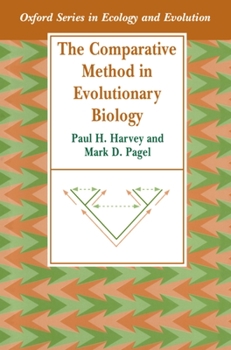The Comparative Method in Evolutionary Biology
From Darwin onward, it has been second nature for evolutionary biologists to think comparatively, because comparisons establish the generality of evolutionary phenomena. Do large genomes slow down development? What lifestyles select for large brains? Are extinction rates related to body size?
These are all questions for the comparative method, and this book is about how such questions can be answered. It examines how the comparative method complements...
Format:Paperback
Language:English
ISBN:0198546408
ISBN13:9780198546405
Release Date:June 1991
Publisher:Oxford University Press, USA
Length:248 Pages
Weight:0.95 lbs.
Dimensions:0.6" x 6.8" x 8.7"
Customer Reviews
0 rating





